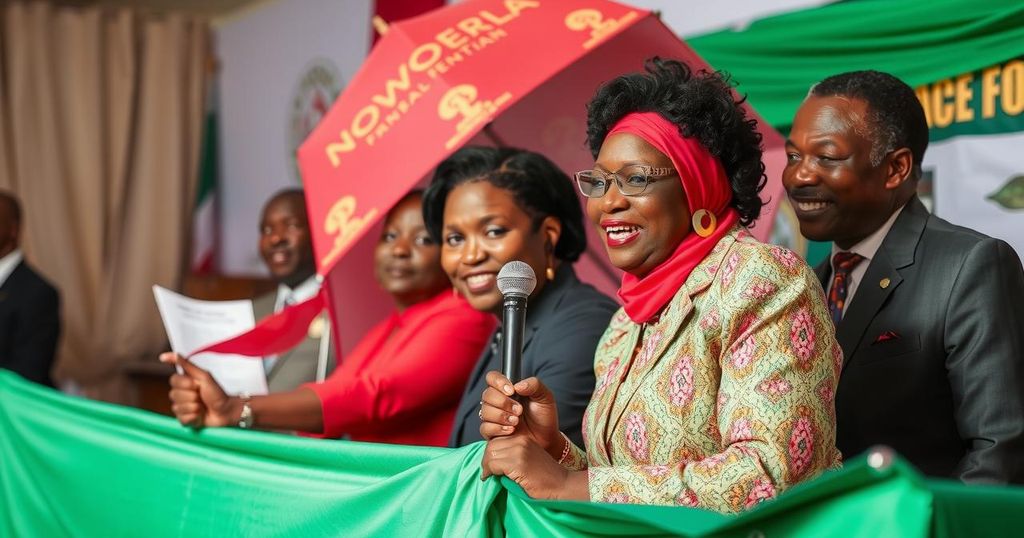The UDC’s election victory in Botswana represents a historic shift in governance, as it becomes the first opposition party to hold power since independence, responding to widespread calls for social change after decades of BDP rule. However, despite promises of job creation and economic diversification, concerns arise that the UDC’s pro-business stance may undermine its commitment to genuine reform. The developments also reflect broader regional trends of opposition against long-standing ruling parties due to rising economic disparities and calls for improved governance.
In the wake of a historic election, the Umbrella for Democratic Change (UDC) has asserted its governance in Botswana, marking a significant political shift as it becomes the first opposition party to ascend to power since the nation’s independence. Duma Boko, the UDC leader, was sworn in as president on November 1, succeeding the Botswana Democratic Party (BDP), which had held power since 1966 but saw its representation plummet to just four seats in the National Assembly after the UDC secured 35 of the 61 available seats. This electoral outcome reveals an intense desire for social reform among the populace, particularly among workers, youth, and rural constituents, who have endured decades of BDP rule, coupled with rising economic disparities exacerbated by global conditions such as the ongoing conflict in Ukraine and stringent IMF policies.
The election results extend beyond Botswana, mirroring a growing trend in sub-Saharan Africa, where established ruling parties face increasing dissent. The African National Congress (ANC) in South Africa lost its majority in 2023, and Namibia’s SWAPO struggles with electoral support, hinting at a broader regional resistance against entrenched, bourgeois-nationalist leadership. Movements against such ruling parties are gaining momentum not only due to local grievances but also as reactions to international economic influences.
Despite the UDC’s assertions of progressive intent, its underlying pro-business agenda raises concerns about the authenticity of its commitment to social change. President Boko’s promises of job creation and diversifying Botswana’s economy from a diamond industry heavily reliant for export revenue may not materialize as the UDC’s ties to business interests imply significant compromises. In his inaugural speech, Boko emphasized fostering a favorable business environment to attract foreign investment, signaling potential policy shifts towards deregulation and privatization that could jeopardize social promises made during the electoral campaign.
Moreover, Boko’s administration is already pivoting towards nurturing relationships with established corporate entities, particularly De Beers. He refrained from criticizing the diamond conglomerate, a crucial player in Botswana’s economy, fostering cooperation rather than confrontation. His agenda suggests opening up the mining sector, which may expedite resource exploitation under corporate control instead of prioritizing the needs of the populace.
In further developments, Boko has taken steps to militarize the region, permitting the establishment of a logistics hub for the Southern African Development Community to deploy forces to manage social unrest. With this move, his administration may use military means against potential dissent rather than addressing the socio-economic issues plaguing the country.
Critics of the UDC, including those aligned with Trotskyist perspectives, argue that the governance model does not align with socialist principles. The suggestion that the UDC could usher in substantial economic rebalancing or social justice devoid of a revolutionary working-class movement is considered naïve. The historical trajectory of national bourgeoisie governance in Botswana suggests that merely changing the ruling party will not alter the fundamental inequalities entrenched within the economic structure.
Ultimately, the developments in Botswana underscore the necessity for a comprehensive, worker-led struggle aimed at achieving genuine empowerment and dismantling the structures that perpetuate inequality. The path to such a transformation requires a united front of the working class against both local elites and imperialist forces, adhering to the principles of Permanent Revolution, as articulated by Leon Trotsky. The future of Botswana’s socio-economic landscape hinges on this collective awakening and mobilization of the masses against all forms of capitalism that continue to disenfranchise them.
The recent electoral victory of the Umbrella for Democratic Change (UDC) represents a turning point in Botswana’s political landscape, as it becomes the first opposition party to govern after over five decades of Botswana Democratic Party (BDP) rule. This change is reflective of widespread demands for social justice and economic reform, accompanied by rising dissatisfaction among various demographics including workers and youth. The context of this political shift is heightened by global economic challenges and regional shifts in governance, with established parties across Southern Africa facing growing scrutiny. The trajectory of Botswana’s political evolution continues to echo deeper issues of class struggle and the challenges in realizing true democratic governance amidst lingering economic disparities.
In summation, the ascension of the UDC in Botswana is emblematic of a larger regional desire for change amid longstanding inequalities perpetuated by the BDP’s rule. However, President Boko’s pro-business rhetoric and governmental actions suggest a deviation from genuine reforms towards maintaining elite dominance and economic exploitation. The historical lessons drawn from Botswana’s political landscape emphasize that transformative social change requires an organized, revolutionary movement of the working class rather than reliance on bourgeois governance. The fight for equitable socio-economic rights mandates a re-evaluation of leadership across Southern Africa, pointing towards a more comprehensive struggle against entrenched capitalist systems.
Original Source: www.wsws.org






